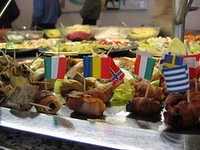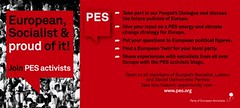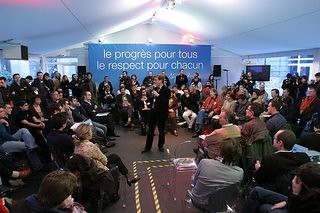 Democracy at the EU level is stronger than ever before but is far from complete. Citizens feel more at ease with national politics than the European Union. If the EU is the 4th house of our democracy (after the local, regional and national) how can we make it more like a home? At the same time European countries are becoming more diverse with immigration and EU citizens moving from one Member State to another. What should the European Union do to make our societies fully at ease with our new diversity? How can the EU protect and improve the rights of the individual?
Democracy at the EU level is stronger than ever before but is far from complete. Citizens feel more at ease with national politics than the European Union. If the EU is the 4th house of our democracy (after the local, regional and national) how can we make it more like a home? At the same time European countries are becoming more diverse with immigration and EU citizens moving from one Member State to another. What should the European Union do to make our societies fully at ease with our new diversity? How can the EU protect and improve the rights of the individual?At at the first of our PES Manifesto debates "Unity or diversity - What Europe do we want?" we had a fantastic debate.
David Schoibl kicked off by arguing that we need to reflect on the past. Europe turned itself in after the colonial carve up in the 1870s and then with the successive world wars. When Europe has been divided, it has not only failed itself but also the rest of the world. To get rid of this narrow militant nationalism that has torn the continent apart in the past, we couldn't just set up Europe as an abstract concept. We needed to start off with tangible linkages, we needed to build institutions as tools of integration.
The challenges are as complex now with both the mismatch between the economic elites and the reality of the effects of globalisation on the one hand and the different speed of European integration (Eurozone, Schengen, etc) on the other. He advised that we therefore also need to work out how we can collectively solve the issues of globalisation in a tangible way. This includes giving up vetoes so we can take on together vested interests. He also advised that regional devolution has helped Scotland, Wales and Northern Ireland better engage with the EU. In the relative merits of PR and single list to elect MEPs, he remarked that the "green agenda" shows proportional representation is effective in raising emerging issues. For example, the Green Party's rise in votes had a virtuous impact in raising awareness of this issue to the social democratic parties and Die Link has a similar impact on how the SPD is discussing its social policy.

He proposes greater
- Power for the European Parliament
- Use of the citizen's rights of initiatives
- European perspective of history
- Integration of the EU in lessons and education
- Rights for EU citizens
- Regional governments consult people living in their regions on European consultations already taking place.
Local voices, European accountabilityGiving local government a direct line into EuropeHe then discussed how to connect the EU with local democracy. Europe has an essential role to play in local areas. The EU is often seen by local authorities as either a "problem solver" (such as through structural funding), a "stage" (such as through profile-raising, notably European Cities of Culture), a "threat" (liberalisation of services challenges traditions of local public provision), an "alternative" (to escape the hierarchy of its own national political system), a "duty" (implementation of EU regulations).

While local government used to focus its minds on cohesion funding, that is now naturally going to the poorer eastern European member states. The other 80% of funding available is managed by Whitehall through quangos and agencies. Regional offices do represent local authorities in Brussels and one participant mentioned that they are a top priority for MEPS whose region they lead. But how do we use regional power and how can we educate local authorities to use these offices more? The political balance of control has also meant there are more councillors who are Eurosceptic and so less likley to engage the Commitee of the Region or MEPs.
Indeed, the Commitee of Regions is a quango in itself whose board members are nominated by national governments. As they are not elected, they are only accountable to central government and not local government. With the Reform Treaty, it does still remain an advisory body but can now refer to the Court of Justice for violations of the principle of subsidiarity (that each decision should be taken at the lowest appropriate level). In essence, this could make it the "guardian of the rights and responsibilities of local government and an advocate for the wider development of power to local authorities".
Its board members should be Leaders of Councils elected by local councillors from all of the administrative regions at the same time as European elections
Transformed into a second chamber to the European Parliament, so as to become a co-decider and made responsible for leading on legislation directly relevant to local government
Local and regional governments should also use the citizens' right of initiative and work together across borders to collect signatures of common interest and concern
Reconnecting citizens to MEPsThere is also insufficient contact between MEPs and their local authorities, except through specific events or through local government associations. The fact the European Parliament is based in two cities doesn't help either. However, as it is directly elected and with the increased powers through the Lisbon Treaty (co-legislator on most areas of EU policy, new powers of supervision over exercise of delegated legislative powers by the European Commission), it should be the EU institution that is the most accessible to local authorities. The regional list for the European Parliament is obscure and ultimately determined by the party nationally and reduces local accountability. He proposes:
- Single member constituencies should be reintroduced to reconnect citizens to individual MEPS
- MEPs should be elected through the Supplementary Vote (SV) system or the Alternative Vote (AV system)
- Hold a single annual joint session of the European Parliament making use both "hemicycles" in Strasbourg
He concluded that Europe is happening on our doorstep. We need to tackle disadvantage and need to address the issues. Let's make Europe more local, let's win hearts and minds.
Emma Jones, Haringey councillor and Labour candidate for the European ParliamentShe advised that Europe could learn from community engagement initiatives. Emma proposed that we should
- support the citizens' initiative (one million petitioners) by providing a structure for it. e.g. epetitions (as currently happens in the UK) and good publicity in a way that actively empowers people.
- improve the public consultations for European initiatives which currently don't seem to exist
- introduce European Citizen's Juries for citizens from different countries to debate issues
- create a European Youth Parliament but also a European Older People's Parliament
- make it statutory for all countries to elect proportionally by STV, so the electorate can choose their candidates for the European Parliament
- create pots of small EU funding that local communities can decide how its spent (like Haringey's Making the Difference, with budgets of £50000 per local area)
She also proposed that the PES could work out how to mentor people like herself who are candidates for the European Parliament for the very first time.
Another participant advised that there was a risk of sub-dividing representative democracy and that the best citizen's jury is the European Parliament. David Shoare proposed in this area that the EU should expand its local involvement initiatives like the programme he is involved in Bristol. See a more detailed proposal here.
Managing new migrationMatthew Clifton from NLGN observed there had been a lot of muddled thinking around the issues of migration recently. From talk of losing non-doms to that of excessive numbers of foreigners living here via talk of imposing a sense of Britishness, all seems like a proxy worry about migration. However, with a policy of globalising markets and liberalising employment, the new migration has been a political choice for the last three decades, and coupled with cheap travel and international communication, this has caused a social and economic transformation. This means that we also need to ensure that no community is left behind and so all areas need to improve their NEET (not in education, employment or training) targets.
He advised that immigration isn't a problem, but not being ready for migration is. Government has got to catch up. Evidence shows that the correlation doesn't exist between the pressures on the labour market and the influx of immigrants. When asked about the growing language barriers in multicultural communities, he said that in schools, migration is a massive boon, developing multicultural skills for our children and lifelong learners. However, there is still a lack of accurate information in tracking the movement of migrants which in turn distorts the funding allocation given on the basis of outdated population data.
He proposes that we
- Review the fundamental data requirements for the public realm, including considering whether the census procedure still serves its original purpose
- Introduce the local development of entitlement cards, as a stronger starting point for the trial of local population registers
- Work towards wider UK recognition of qualifications from across the EU as this would help migrant workers from the newer EU member states to find suitable employment and reduce the risk of displacement for young local starters at the lower end of the market.
Proposed greater cooperation on international crime, such as fingerprinting and a criminal record bureau. The UK is against integration on this and one participant argued that the concept of "red lines" makes it more difficult to sell Europe even on these tangible issues.
ConstitutionA participant proposed a five page Constitution written in a language that everyone understands and that everyone can agree on. There was lively debate about what therefore would be excluded from the current Constitution if it was to be only five pages long, especially concerning citizens rights, although the five pages could be used to summarise the Constitution or feature our common values.
The Constitution brought together different treaties which was meant to make more sense but complicated things and the Reform Treaty is even less legible. It was argued that this Treaty is what Europe deserves, given how national governments had not wanted or been able to work together across Europe to make it more relevant to its citizens.
Common valuesDiscussing the potential paradox of unity and diversity, one participant proposed there should be a European debate on where our values emanated from - the Enlightenment, religion, regions - and what we defined respect and justice. Another participant put forward that our shared values are the product of our history and as such could be embodied around the "never again" ethos, that we should make it impossible for the worst excesses of Europe's past to become possible again. Another participant also proposed that those common values are also about the future and therefore the socialisation of Europeans was essential to make the EU forward looking and progressive. But should we be teaching them what's right or wrong, or should we let them discover what these values might be?
 Europe's relationship with other cultures: assimilation or integration?
Europe's relationship with other cultures: assimilation or integration?Unlike with the EU, there is no political union with the Commonwealth, so the UK's relationship with the EU doesn't hinder its relations with the Commonwealth countries.
As to a question on whether the Muslim population of Europe should assimilate to the European culture or vice versa, a participant proposed that neither Europe nor the Muslim community are homogenous, so it would be unfair to treat either as a single body. Problems not just in Europe around issues of religion, minority identity politics and political battles are going on elsewhere in the world such as in the US with the fundamentalist Christain right. There is a need to find common ground in a reasonable way that brings everyone together.
Practical approaches to running similar programmes to ErasmusTo improve diversity, it was suggested we could find some practical approaches to running similar programmes to the student exchange Erasmus. People proposed
- Teaching/exchanging ideas and languages
- expand funds for common apprenticeships and exchanges for older people
- establish a European charter for internships







































